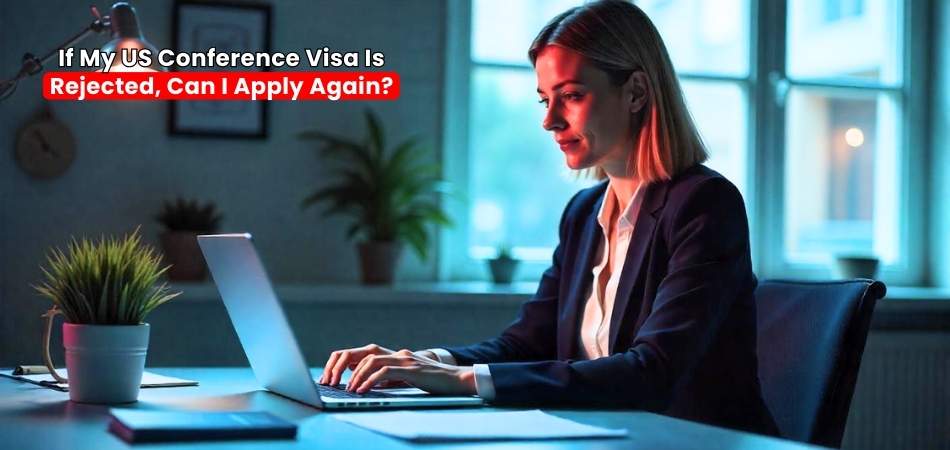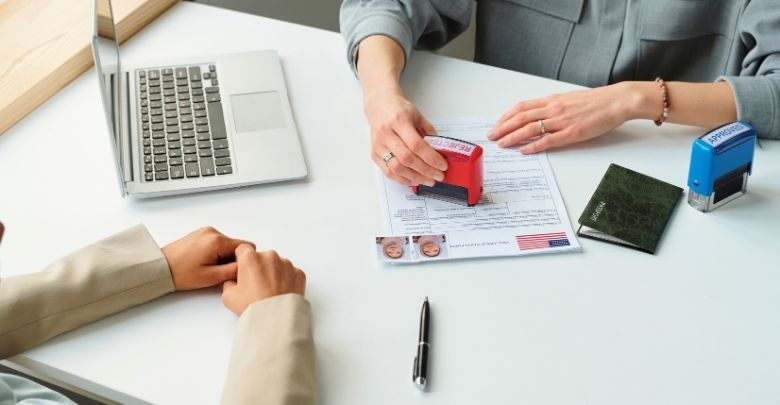Obtaining a US conference visa can open doors to professional growth and networking opportunities. However, visa applications can sometimes be challenging, leading applicants to wonder: If my US conference visa is rejected, can I apply again?
Yes, you can apply again if your US conference visa is rejected. However, you should address the reasons for the initial denial, correct any issues, and ensure your application is stronger before reapplying to improve your chances of approval.
Read the rest of this article for practical tips, reapplication strategies, and guidance to maximize your chances of obtaining a US conference visa.
If My US Conference Visa Is Rejected, Can I Apply Again?
Yes, you can apply again if your US conference visa is rejected. However, you should carefully review the reasons for the denial. Reapplying without addressing those concerns may result in another rejection. You should be prepared and correct any issues that caused the first rejection.

Before reapplying, ensure that your application is complete and accurate. The US consulate will look for improvements in your application. If you were rejected due to missing documents, make sure everything is in order this time. You can also provide additional evidence to strengthen your case.
If you are attending conferences in USA with invitation letter, make sure the letter is valid and clearly presented. A proper invitation letter can increase the likelihood of your visa approval. It proves that you have a genuine purpose for visiting the USA and will return home after the conference.
Seek advice from experts or consult with a visa attorney if needed. They can guide you on how to improve your chances. Reapplying with a clear understanding of what went wrong can lead to a better outcome.
How Long Should You Wait Before Reapplying for a US Conference Visa?
The timing for reapplying after a US conference visa rejection depends on addressing the reasons for the previous denial. Applicants should take time to gather the necessary documents and clarify any issues raised during the first application. Rushing to reapply without fixing these concerns can lead to repeated rejection.
Being aware of the consular officer’s feedback is crucial before submitting a new application. Reviewing your previous application thoroughly helps identify what went wrong. If documents or explanations were unclear, resolve these issues before moving forward.
Waiting at least a few weeks is generally a good approach before reapplying. This allows you to gather stronger evidence and improve your application. Demonstrating changes or improvements increases the chances of receiving a positive outcome.
Every case is unique, so focus on building a stronger case before reapplying. Avoid applying repeatedly without changes to your situation. Patience, preparation, and addressing past issues show seriousness and responsibility to the consular officer.
What Are the Common Reasons for US Conference Visa Rejections?
Applying for a US conference visa can be difficult if common mistakes are not avoided. Many applicants face rejection due to simple errors. Knowing the common reasons for visa refusals can help you prepare better and avoid mistakes.
Incomplete or Incorrect Application Forms
Filling out forms with mistakes can result in a visa rejection. Missing or incorrect details may raise doubts about your application. Carefully reviewing your form ensures accuracy and completeness. Providing consistent and truthful information helps build a strong case.
Insufficient Financial Proof
Showing financial stability is necessary to prove you can cover expenses during your trip. Weak financial documents can lead to rejection. Bank statements should clearly reflect your financial capacity. Demonstrating a reliable source of income strengthens your application.
Lack of Strong Ties to Home Country
Proving strong ties to your home country is important to show you will return. Weak connections may indicate a risk of overstaying. Providing evidence of family, employment, or property ownership supports your case. A well-documented connection to home helps convince the officer.
Unclear Purpose of Visit
Clearly explaining why you are traveling to the US is essential for approval. Vague or inconsistent reasons can create suspicion. Submitting an invitation letter and a detailed itinerary supports your purpose. All provided information should align with your stated travel goals.
Inconsistent Travel History
Having an inconsistent travel record may raise concerns during the visa process. Frequent visa denials can negatively impact your current application. A history of responsible travel improves your credibility. Demonstrating compliance with previous visas shows your reliability.
Inadequate Supporting Documents
Providing incomplete or incorrect documents may lead to rejection. Every required document should be submitted in the correct format. Proper documentation strengthens your case and provides clarity. Missing paperwork can make your application appear weak or unreliable.
Poor Interview Preparation
Being unprepared for the interview can result in mistakes and inconsistencies. Nervousness or unclear answers may create doubts. Practicing common questions helps build confidence. A clear and honest interview increases the likelihood of approval.
Previous Visa Rejections
Previous visa refusals should be carefully reviewed before reapplying to avoid repeated mistakes. Analyzing and knowing the reasons US conference visa refusals can help identify areas that need improvement. Learning from past mistakes and addressing weak points can significantly enhance your next application. Taking corrective measures increases the chances of approval.
Will a US Conference Visa Rejection Impact Future US Visa Applications?
Yes, a US conference visa rejection can impact future visa applications, but it doesn’t mean automatic denial. Consular officers consider the reasons for past rejections when reviewing new applications. Addressing concerns from the previous denial can improve future chances. Transparency and correcting issues are key to building a stronger case.
The impact of a rejection depends on the reasons behind it. Errors or incomplete documents from the first application can raise concerns. However, providing accurate and complete information in future applications shows responsibility. A well-prepared application demonstrates that you’ve resolved past issues effectively.
Honesty is essential when reapplying after a rejection. Consular officers value clear explanations for any previous visa denials. The focus should be on presenting a strong and genuine case. Resolving concerns improves the chances of approval for future visas.
Knowing about the US conference visa renewal process can also help maintain valid travel permissions. A rejection doesn’t prevent you from applying for other visa types. However, ensuring all future applications are well-documented is essential. Taking the time to address concerns boosts your credibility and success rate.
Steps You Can Take to Strengthen Your US Conference Visa Application After Rejection
If your US conference visa application was rejected, don’t be discouraged. By taking the right steps, you can improve your chances of success in the future. The following guide will help you strengthen your application for re-approval.
Step 1: Review the Reasons for Rejection
Identifying the reasons for your visa denial is the first step to improving your application. Carefully read any feedback provided by the consular officer. If no reason is given, try to assess the gaps in your application and focus on resolving those issues.
Step 2: Address Document Gaps
Ensure all required documents are complete and accurate. Missing or incorrect documents can delay the approval process and cause another rejection. Double-check each document to ensure it matches the visa requirements, including invitation letters, financial records, and any other supporting materials.
Step 3: Strengthen Your Financial Proof
Providing strong financial documentation shows you can support your stay in the US without relying on others. Bank statements, tax returns, employment proof, and affidavits of support are essential. Ensure these documents clearly reflect your financial situation and demonstrate stability over time, especially if your financial proof was previously insufficient.
Step 4: Clarify Your Travel Intentions
Provide a clear and detailed explanation of your purpose for attending the conference. Attach an official invitation letter, along with a full itinerary of the event. This shows the consular officer that your visit is legitimate and strictly related to the conference, making it less likely that you will overstay your visa.
Step 5: Demonstrate Strong Ties to Your Home Country
Proving that you will return home after your conference is essential. Show evidence of strong ties to your home country, such as family, work, or property ownership. This assures the officer that you have a compelling reason to return, which lowers the risk of overstaying your visa.
Step 6: Be Honest and Transparent
Be honest about your previous visa refusal and explain it clearly. Transparency builds trust with the consular officer and shows your integrity. Providing a truthful and clear statement increases your chances of success, as the officer can see that you are not hiding any important details.
Step 7: Prepare for the Interview
A well-prepared interview can make a significant difference in your visa approval. Practice common questions and be clear about your purpose, travel plans, and the importance of the conference. Being confident, calm, and straightforward during the interview shows that you are serious about your visit and strengthens your application.
Commonly Asked Questions
In this section, we address frequently asked questions related to the US conference visa application process. If you’ve experienced a visa rejection or are simply looking for further clarification, the following questions and answers will provide you with helpful insights and guide you through the process.
Can I Apply for a US Conference Visa If I Have a Criminal Record?
Having a criminal record does not automatically disqualify you from obtaining a US conference visa, but it may complicate your application. You must disclose any criminal history during your interview, as withholding this information can lead to a visa refusal. You may need to apply for a waiver or provide evidence that you have been rehabilitated or that the offense is not relevant to your current application.
What Is the Role of an Invitation Letter in the Visa Application?
An invitation letter from the conference organizers is a key document in your visa application. It should clearly state the purpose of your visit, the dates of the event, and any relevant details. A well-written letter helps to authenticate your reason for traveling and supports your overall application.
Is It Possible to Appeal a US Conference Visa Denial?
Unlike some other visa processes, there is no formal appeal process for a US conference visa denial. However, you can reapply with additional supporting documentation or address any issues that led to the denial. You should ensure that the reasons for the rejection are resolved before reapplying.
What Is the Best Time to Apply for a US Conference Visa?
It is recommended to apply for a US conference visa at least 3 to 4 months before the scheduled conference. This allows ample time for processing and any unforeseen issues that may arise. Applying early ensures that you have enough time to address any concerns.
Can I Apply for a US Conference Visa if I Am Self-Employed?
Yes, self-employed individuals are eligible to apply for a US conference visa. However, you must provide proof of your self-employment status, such as tax returns, business registration, and financial statements. Demonstrating that you can fund your trip and have strong ties to your home country is essential.
Bottom Line
If your US conference visa is rejected, it can be frustrating, but it doesn’t mean the end of your chances. Knowing the reasons behind the rejection is crucial for your next steps. Carefully address any issues to make your reapplication stronger.
Now, you may be thinking, if my US conference visa is rejected, can I apply again? The good news is, yes, you can reapply. However, you must resolve the reasons for the rejection. Taking time to fix mistakes, strengthen financial proof, and clarify your travel intentions will help. Demonstrating improvements will improve your chances significantly.
So, patience and careful preparation are key when reapplying for a US conference visa. Focus on presenting an honest and well-documented application. By learning from previous mistakes, you can increase your chances of success in the future.







